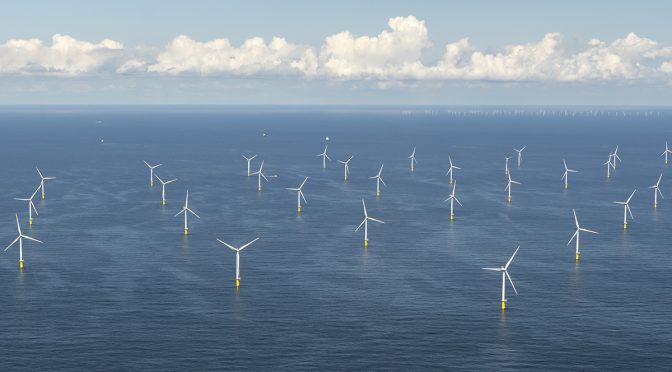National Clean Energy Week is the perfect time to spotlight the next major source of American power: Offshore Wind. The growing U.S. offshore wind industry has demonstrated its resilience amidst the COVID-19 pandemic. This summer, the first two wind turbines of the Coastal Virginia Offshore Wind (CVOW) project were installed off the coast of Virginia. Developed as part of a pilot project by Ørsted, Dominion Energy and Siemens Gamesa Renewable Energy, the CVOW project marks the first offshore wind project in federal waters and the second offshore wind farm in the United States. Maritime businesses in coastal Virginia are already experiencing the economic benefits that offshore wind can bring to their communities.
With a power potential of almost double the nation’s current electricity use sitting idly off the Atlantic coastline, America’s vast offshore wind resource, once unleashed, will create thousands of new maritime and manufacturing jobs for coastal communities at a time when economic growth is needed most. AWEA research found developing 30 gigawatts (GW) of offshore wind could deliver up to $25 billion per year in new economic activity and support up to 83,000 new, well-paying jobs by 2030. By continuing the Bureau of Ocean Energy Management’s leasing process, the U.S. could unlock $1.7 billion in U.S. Treasury revenue by 2022, according to a recent study conducted by Wood Mackenzie, released by AWEA, the National Ocean Industries Association (NOIA), the New York Offshore Wind Alliance, and the University of Delaware’s Special Initiative on Offshore Wind.
With 15 active commercial wind energy leases in the pipeline, and with policy certainty, U.S. offshore wind is set to take off within the next decade. States along the nation’s East Coast have made substantial commitments to offshore wind to help meet their climate sustainability goals. New York and New Jersey are looking to get their bites at the apple as each respective state issued offshore wind solicitations this past summer. Continuing to capitalize on this opportunity will revitalize local economies and industries while fueling our nation’s economic recovery. Offshore wind power will also deliver emissions-free clean energy to millions of Americans and businesses, thus reducing America’s carbon footprint.
Developing, building, and operating U.S. offshore wind projects offers a chance for skilled workers to apply their craft to a new industry and will create opportunities to develop new domestic supply chains. And the growth of the U.S. offshore wind industry will not only create new jobs for experienced legacy oil and gas energy workers along the nation’s Gulf Coast. U.S. offshore wind will also create jobs for manufacturers, steelworkers, and construction contractors along the Atlantic shoreline. In fact, more than 70 different types of occupations are needed to plan, develop, operate, and maintain offshore wind farms. These good-paying jobs include welders, wind technicians, electricians, longshoremen, vessel operators, and engineers.
The burgeoning U.S. offshore wind industry can serve as a catalyst to bring manufacturing back to American communities and revitalize local economies. The latest installment of AWEA’s #SupportOffshoreWind video series highlights the enormous opportunities offshore wind will provide for small business manufacturers and supply chains in the Baltimore, Maryland region.
Once an old steel mill site, Maryland’s TradePoint Atlantic has transformed itself into a growing manufacturing and construction hub for area small businesses like Strum Contracting Co. Located in Sparrow’s Point, MD, Strum Contracting Co. focuses on heavy civil infrastructure construction and installation of steel elements including bridges and renewable energy projects. Through investment in U.S. offshore wind, Strum’s Chief Operating Officer Teaera Strum describes how the company was able to grow its physical space from 3,500 square feet to 20,000 square feet and expand its fabrication and manufacturing services. Teaera says it best, “The investment in offshore wind is paying off.”
Similarly, TradePoint Atlantic Managing Director Kerry Doyle, says the most promising opportunity to bring manufacturing back to the Baltimore region is the offshore wind industry. Serving as a modern global logistics and maritime center, TradePoint Atlantic allows companies to unleash their potential and create jobs for those in the community. Doyle says, “We’re really building for the future and we see offshore wind as being that future.”
The U.S. offshore wind industry holds significant promise for future job creation, project construction, economic development, and investment in critical infrastructure. U.S. offshore wind is exactly the kind of once-in-a-generation opportunity we need to take advantage of as we build a better post-pandemic, and clean energy future.
To learn more about the benefits of offshore wind and how to #SupportOffshoreWind, visit supportoffshorewind.org


